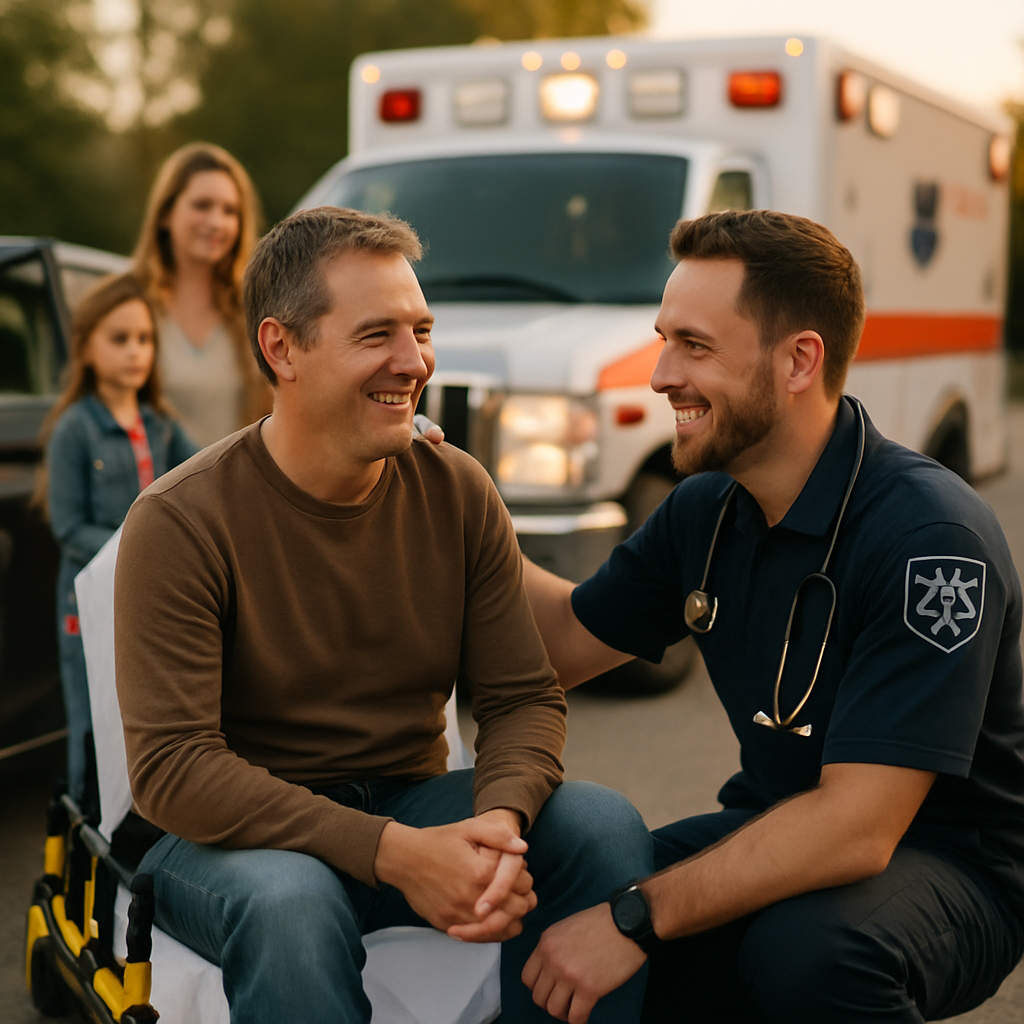SR22 Medical Payments Coverage: Pays Your Medical Bills After an Accident, No Matter Who’s at Fault
Auto accidents can bring unexpected medical bills that regular insurance doesn’t always cover. This crucial coverage pays for you and your passengers’ medical care after a crash—helping you avoid out-of-pocket surprises, even if the accident wasn’t your fault or you don’t have full health insurance.

Real Situations Where SR22 Medical Payments Coverage Helps
Real scenarios that show exactly when and how Medical Payments Coverage protects you—even if you have SR22 requirements.

Ambulance Costs After a Fender Bender
Mike was driving home when he was rear-ended at a stoplight. Although his injuries were minor, the ambulance and emergency room bills totaled $1,500. His Medical Payments Coverage paid the full amount, no questions asked. Instead of getting hit with an unexpected expense, Mike paid nothing out-of-pocket and quickly focused on recovering.

Passenger’s Broken Arm Covered
Jessica was driving with her friend when they were sideswiped by another car. Her friend suffered a broken arm and needed hospital care costing over $5,000. The Medical Payments Coverage immediately covered these medical bills. Instead of borrowing money or worrying about collections, Jessica’s friend received fast care and Jessica didn’t face difficult conversations about payment.

Multiple Passengers—Major Crash, Major Help
After a late-night collision, Mark and his two friends were all injured and required hospital stays. Their combined medical bills soared past $16,000. Medical Payments Coverage paid benefits up to the policy’s $10,000 per-person limit, saving Mark from crippling debt and ensuring everyone received proper treatment. This coverage prevented a financial crisis at a critical time.
SR22 Medical Payments Coverage Explained: The Details That Matter
The complete picture: what's covered, what's not, and how to decide if you need it.
SR22 Medical Payments Coverage (Plain English)
SR22 Medical Payments Coverage pays your and your passengers’ medical bills after a car accident—no matter who was at fault. When you’re injured in a crash, this coverage immediately pays for reasonable and necessary medical and funeral expenses (like ambulance rides, ER visits, and treatment), up to the coverage amount you choose. The key thing to understand is that it protects your finances and your health by covering medical costs that auto or health insurance might leave you paying.
Important Fine Print
No deductible applies—Medical Payments Coverage pays first dollar for covered injuries. Limits usually range from $1,000 to $25,000 per person per accident (you choose the amount). Coverage is for reasonable and necessary medical expenses only. It does not cover lost wages, long-term care, or pain and suffering. Bills must be related to injuries from an auto accident—routine or unrelated medical care isn’t covered.
SR22 Medical Payments vs. Other Coverages
SR22 Medical Payments Coverage is NOT the same as Personal Injury Protection (PIP). Medical Payments covers just medical and funeral bills after an accident, while PIP (unavailable in Colorado and Utah) includes lost wages and other personal expenses. You may need health insurance alongside this for the most complete protection.
Who Needs SR22 Medical Payments Coverage?
You typically need this coverage if:
- You are required to file SR22 (high-risk drivers)
- Your car is insured with only basic (minimum) liability
- You don't have comprehensive health insurance, or your health plan has high deductibles for accidents
You might skip this coverage if:
- Your car is insured with full coverage and you already have low out-of-pocket health costs
Coverage Limits and Options
Choose a limit per person, per accident (commonly $1,000 to $25,000). No deductible needed—coverage pays from the first dollar. Higher limits offer more peace of mind but may increase premiums slightly. Medical Payments is optional—add only what fits your needs and budget.
What's NOT Covered by SR22 Medical Payments Coverage
This coverage does NOT cover:
- Injuries from racing, delivery driving, or rideshare (like Uber/Lyft): Commercial/business use is excluded.
- Lost wages or long-term care: Only direct medical/funeral expenses are paid.
For these situations, you'd need other specific coverages such as commercial auto or disability insurance.
See Your Price with Medical Payments Included
Now that you understand Medical Payments Coverage, see how affordable protection can be with personalized quotes from 26+ carriers.

Experience You Can Trust
1,430+ customers trust our expertise to explain coverage clearly and find the right protection for their specific needs.
4.9/5 Stars
Google Reviews from real customers, just like you
97% Retention
Customers stay with us year over year over year
Independent
We work for you, not insurance companies
Local
Fort Collins owned & operated since 1992
How SR22 Medical Payments Coverage Actually Works
Understanding exactly what happens when you file a Medical Payments claim—from start to finish.
The Claims Process
- Get Medical Care Immediately: After an accident, seek care for any injuries (ambulance, ER, doctor). Save all bills and receipts.
- File Your Claim: Contact your insurer promptly with incident details and medical documentation.
- Claim Reviewed: The insurance adjuster checks your bills are accident-related and within limits. Bills are paid directly or reimbursed—no deductible required.
- Receive Payment: Your insurer pays your providers (or you) up to your limit. The process is usually fast so you can focus on healing, not paperwork.
What You Pay
No deductible applies—Medical Payments starts covering your eligible expenses right away. Your premium is typically just $30–$70 per year. As with most coverages, your premium may be higher or lower based on vehicle, driver, and limit selection, but Medical Payments Coverage is one of the most affordable protections you can add.
Timeline
Simple claims often resolve in a few days, while complex situations involving multiple passengers or documentation may take up to two weeks. Most customers find the process quick and reassuring. The key is prompt reporting—the sooner you submit bills, the faster you receive payment.
What SR22 Medical Payments Coverage Actually Costs vs. What You Risk
Understanding the real financial impact: what you pay for coverage vs. what you risk without it.
Minor Accident—Ambulance & ER Visit
Annual Coverage Cost: $45
Scenario: Single-trip ambulance ride and ER evaluation after a minor fender bender
Without Coverage: $1,500 out-of-pocket
With Coverage: $0 (fully paid by Medical Payments)
Protection Value: $1,455 saved in this scenario alone
Broken Arm from Sideswipe
Annual Coverage Cost: $50
Scenario: Passenger's broken arm in a moderate crash, with treatment and follow-ups
Without Coverage: $5,200 out-of-pocket
With Coverage: $0 (fully paid by Medical Payments)
Protection Value: $5,150 saved—real money directly back in your pocket
Major Crash—Multiple Injuries
Annual Coverage Cost: $65
Scenario: Three people hospitalized after a serious accident. Each has $8,000 in medical bills.
Without Coverage: $24,000 out-of-pocket
With Coverage: $0, up to $10,000 each (depending on your limit)
Protection Value: Over $23,900 saved—protecting your finances from disaster
The Economic Reality
For most people, Medical Payments Coverage costs about $4 per month—less than a single coffee shop visit. One accident with injuries could cost $5,000 to $25,000 or more, taking years to pay off. The math is simple: this coverage pays for itself with just one use and can protect your savings from sudden, unpredictable medical bills after an auto accident.
4 Costly SR22 Medical Payments Coverage Mistakes to Avoid
Learn from others' mistakes—avoid these common errors that can leave you unprotected when you need coverage most.
Assuming Health Insurance Always Covers Auto Injuries
Many assume their health insurance will pay for injuries after a car accident, but plans often have high deductibles, copays, or won’t pay for accident-related ambulance and ER bills. Skipping Medical Payments means unexpected expenses. Instead, add this affordable coverage for direct payment of auto injury bills—especially if your health plan has gaps.
Believing SR22 Automatically Includes Medical Payments
It’s a common misconception that SR22 filings include Medical Payments. They do not—SR22 is only proof of minimum liability. You must add Medical Payments separately to get this protection. Always review your policy for what’s actually covered, not just what you’re required to carry.
Choosing the Lowest Limit Without Considering Risks
Selecting only $1,000 in Medical Payments coverage might keep your premium low, but medical costs can far exceed this amount in any accident. Low limits can leave you paying thousands out-of-pocket. Choose a limit that truly protects you and your passengers—often $5,000 or $10,000 is a better value for just a few extra dollars a year.
Ignoring Passenger Needs
Some drivers think only their own expenses matter, but accidents often injure passengers, too. If your passengers aren’t covered, you could face their medical bills or legal action. Instead, ensure your Medical Payments Coverage protects everyone in your vehicle to reduce risk, stress, and possible legal trouble.
Find answers to your most pressing insurance questions right here.
Explore Your Coverage Options
Discover the best insurance coverage tailored to your individual needs and protect what matters most.

